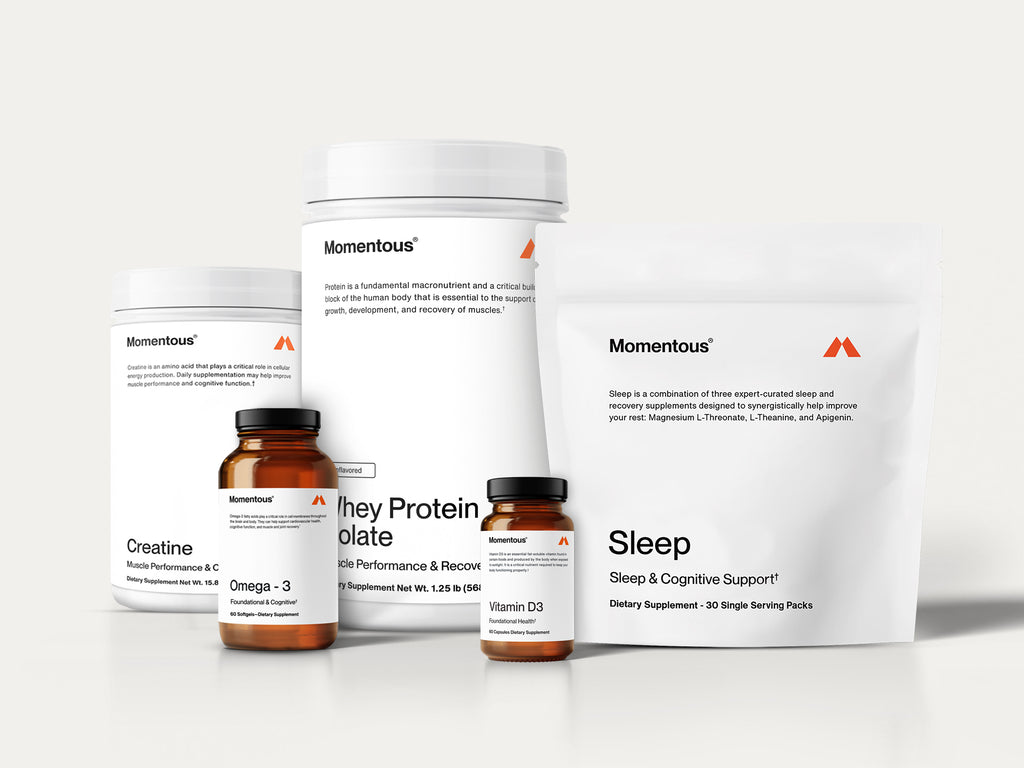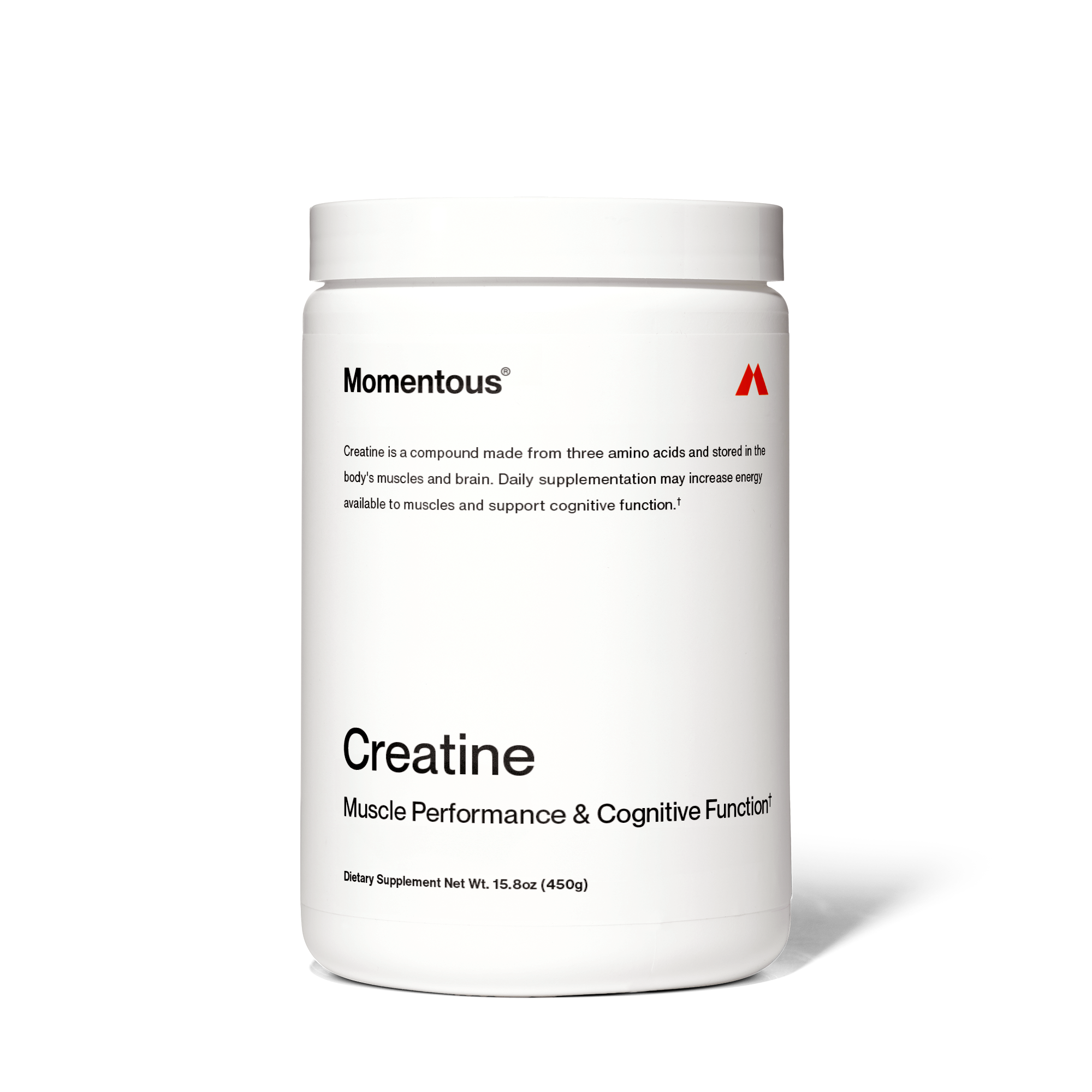Muscle Performance, Cognitive Function
What Is Creatine?
Creatine is a powerful amino acid that has long been synonymous with physical performance, but recent research suggests that creatine’s benefits go beyond increased muscle and faster recovery—it may improve cognitive performance as well. Every day a small amount of creatine is naturally produced by your kidneys, liver and pancreas and put to work in your muscles and brain, but studies suggest that supplemental creatine may help:
- Improve cognitive performance and overall brain health
- Create new nerve cells and protect existing nerve cells
- Increase muscle strength and endurance
- Boost energy levels and lower recovery time
- Decrease risk of injury from physical activity
For these reasons and more, countless athletes see creatine as a cornerstone of their performance regimens. But you don’t need to be an elite competitor to experience the benefits of this essential amino acid. Regardless of your performance level, incorporating creatine into your daily routine can help you enhance your cognition, get more out of your gym sessions, and increase your energy levels to better tackle whatever life throws your way.
The Science Behind Creatine
Creatine is one of the most-studied natural supplements in the world, and the closer researchers look, the more impressive this dynamic amino acid becomes. In the human body, creatine is stored in our muscles and brain where it is used for energy. In addition to the small amount of creatine naturally produced by your body every day, creatine can also be derived from food sources such as seafood and red meat. Countless studies have suggested that supplemental creatine can have myriad benefits for muscle strength, endurance, recovery and injury prevention, but researchers are increasingly interested in creatine’s cognitive benefits.
Creatine for Cognition
While most creatine found in the human body is stored as phosphocreatine in muscles, a significant portion is also kept in the brain where it provides energy for cognitive function. Recent studies suggest that supplemental creatine may help improve cognition, especially when you’re experiencing a creatine deficiency due to an acute stressor like sleep deprivation or a more chronic condition such as depression, Alzheimer’s, a mild traumatic brain injury, or a natural cognitive decline brought on by aging.
In a study included in a broad review of research, a group of subjects over the age of 60 were given supplemental creatine and engaged in strength training for 16 weeks. Participants in the study were tested for cognitive performance using the Montreal Cognitive Assessment questionnaire both before and after the 16-week intervention and significant improvements were found in their post-intervention scores.
Other studies included in the review focused on the effects of supplemental creatine on decision-making, coordination and other cognitive tasks with athletes as subjects. Researchers found that creatine supplementation improved the throwing accuracy of sleep-deprived rugby players. In another study, creatine supplementation improved the cognitive performance of semi-professional mountain bikers without imposing sleep deprivation on the subjects beforehand—in other words, their research suggested that creatine had cognitive benefits even without a background stressor.
“I am in love with this product from Momentous! I can’t remember having so much energy and focus before starting this supplement. It’s a must on my daily checklist now.”
- Mimi L., Verified Customer
Creatine for Strength and Endurance
When it comes to physical performance, perhaps no other natural supplement has a better track record than creatine. Most of the creatine found in your body is stored in your muscles, where it provides the energy that you use during high-intensity physical activity. Taking supplemental creatine increases your muscles’ capacity to do work, allowing you to train harder, build more muscle mass and improve physical performance.
In a review of more than 250 scientific studies, researchers found that after a period of creatine loading, subjects saw their performance in repetitive, high-intensity exercises increase by 10 to 20%. Studies suggest that supplemental creatine can also help your body replenish its glycogen stores, which is helpful for muscle recovery after intense exercise. Supplemental creatine may also help prevent injuries, rehabilitate existing injuries and decrease your risk of dehydration.
Incorporating Creatine Into Your Daily Routine
Add two 5mg scoops of creatine to a tall glass of water, your morning smoothie or any beverage of your choosing once a day for your first week of supplementation, then scale back to one scoop per day after your first week. This tasteless powder mixes easily with liquids and you should begin to experience the benefits of creatine after two to four weeks of daily use.
Enhance Cognition and Build Strength with Creatine
From improving cognitive processing to increasing muscle capacity to boosting your energy levels, there are many reasons to take supplemental creatine. While early research focused mainly on the benefits of this potent amino acid for high-performance athletes, it has become increasingly clear that you don’t need to be in the running for an Olympic medal to experience significant benefits from creatine. Anyone pursuing an active lifestyle can benefit from the physical effects of supplemental creatine, and everyone can appreciate the amino acid’s cognitive benefits as they age.
When you choose Momentous Creatine, you’ll get the highest-quality, single-source creatine monohydrate—the gold standard in creatine supplementation. Our Creatine is vegan, contains zero additives and is NSF and Informed Sport Certified.









